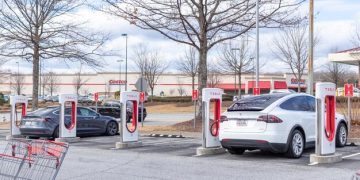Addressing the EV Skills Gap: How US Automakers Are Adapting

US auto manufacturers are addressing the skills gap in electric vehicle maintenance and repair by investing in training programs, partnering with educational institutions, and offering specialized certifications to upskill their workforce for the EV revolution.
The automotive industry is undergoing a seismic shift with the rise of electric vehicles (EVs). This transformation brings significant challenges, notably the widening skills gap in electric vehicle maintenance and repair. How are US auto manufacturers stepping up to bridge this gap and ensure a smooth transition into the electric future?
The Burgeoning Electric Vehicle Market and its Impact on the Workforce
The electric vehicle (EV) market is experiencing exponential growth in the United States, driven by increasing consumer demand, government incentives, and environmental concerns. This surge in EV adoption necessitates a skilled workforce capable of maintaining and repairing these advanced vehicles.
However, the existing pool of automotive technicians lacks the specific expertise required for EVs. Traditional automotive training programs often focus on internal combustion engine (ICE) vehicles, leaving technicians unprepared for the unique challenges posed by EVs, such as high-voltage systems, battery technology, and advanced software.
This skills gap threatens to hinder the widespread adoption of EVs, as consumers may hesitate to purchase electric vehicles if they are concerned about the availability of qualified technicians and repair services. Therefore, US auto manufacturers are actively working to address this challenge by investing in various training and development initiatives.
The Core Competencies Needed for EV Maintenance
EV maintenance requires a distinct set of skills compared to traditional ICE vehicles. Technicians need to be proficient in the following areas:
- High-Voltage Systems: Working safely with and diagnosing issues within high-voltage systems, including battery packs and power electronics.
- Battery Technology: Understanding battery chemistry, management systems, and charging infrastructure.
- Software Diagnostics: Utilizing advanced diagnostic tools to troubleshoot software-related problems, which are prevalent in EVs.
- Electric Motors and Drivetrains: Repairing and maintaining electric motors, inverters, and other components specific to EV drivetrains.
These competencies require specialized training and hands-on experience, which US auto manufacturers are actively providing through various initiatives.

In conclusion, the EV market’s rapid growth is creating a demand for specialized skills. The core competencies listed are essential for technicians to effectively maintain and repair EVs, and manufacturers are investing in training to meet these needs.
OEM Initiatives: Investing in Technician Training Programs
Original Equipment Manufacturers (OEMs), such as Ford, General Motors, and Tesla, are leading the charge in addressing the skills gap by establishing comprehensive technician training programs. These programs aim to equip technicians with the necessary knowledge and skills to work on EVs safely and effectively.
OEMs are investing heavily in state-of-the-art training facilities, equipped with the latest diagnostic tools and equipment. These facilities provide technicians with hands-on experience working on actual EVs, allowing them to develop practical skills and build confidence.
These programs also often include partnerships with community colleges and vocational schools. By working with educational institutions, OEMs can ensure that future technicians receive the necessary training from the outset, creating a pipeline of qualified EV specialists.
Examples of OEM Training Initiatives
Several OEMs have launched notable training programs to address the EV skills gap:
- GM’s Electric Vehicle Technician Training Program: This program provides technicians with in-depth training on GM’s electric vehicle platforms, including the Chevrolet Bolt and Cadillac Lyriq.
- Ford’s EV Certification Program: Ford has developed a comprehensive certification program for technicians working on its electric vehicles, such as the Mustang Mach-E and F-150 Lightning.
- Tesla’s START Program: Tesla’s START (Student Automotive Technician) program partners with colleges to provide students with hands-on training on Tesla vehicles.
These initiatives demonstrate the commitment of US auto manufacturers to building a skilled workforce that can support the growing EV market.

To summarize, OEMs are taking proactive steps to address the EV skills gap through dedicated training programs, investment in facilities, and collaborations with educational institutions. These initiatives are crucial for ensuring a smooth transition to an electric vehicle future.
Collaborations with Educational Institutions: Building a Skilled Pipeline
Recognizing the scale of the skills gap, US auto manufacturers are increasingly collaborating with educational institutions, including community colleges, vocational schools, and universities. These partnerships aim to integrate EV-specific training into existing automotive programs and create new specialized courses.
By working with educational institutions, manufacturers can help shape the curriculum to meet the specific needs of the EV industry. This ensures that students receive relevant and up-to-date training, preparing them for careers in EV maintenance and repair.
These collaborations often involve the donation of vehicles and equipment, providing students with hands-on experience working on the latest EV technology. Manufacturers may also offer internships and apprenticeships, allowing students to gain valuable real-world experience and build connections with potential employers.
The result of these collaborations is a strengthened pipeline of qualified EV technicians, prepared to meet the growing demand for skilled professionals in the automotive industry.
The partnerships not only benefit students but also serve to enhance the reputation of educational institutions, attracting more students to their automotive programs and fostering a culture of innovation and technological advancement.
In short, collaborations between manufacturers and educational institutions are vital for closing the EV skills gap and ensuring a sustainable future for the electric vehicle industry in the United States.
The Role of Government Initiatives and Funding
Government initiatives and funding play a critical role in supporting the efforts of US auto manufacturers to address the skills gap in electric vehicle maintenance and repair. Federal and state governments are offering various incentives and grants to encourage training programs and workforce development initiatives.
These government programs often focus on providing financial assistance to educational institutions, enabling them to purchase the necessary equipment and develop EV-specific training courses. They may also offer scholarships and tuition assistance to students pursuing careers in EV maintenance and repair.
In addition, the government is promoting public awareness campaigns to highlight the importance of EV technology and encourage more individuals to enter the field. These campaigns aim to attract a diverse pool of talent and ensure that the workforce reflects the changing demographics of the United States.
Examples of Government Support for EV Training
Several government initiatives are helping to address the EV skills gap:
- The Infrastructure Investment and Jobs Act: This act includes funding for EV infrastructure and workforce development, supporting training programs for EV technicians.
- State-Level Grant Programs: Many states offer grant programs to support EV training initiatives at community colleges and vocational schools.
- Apprenticeship Programs: Government-sponsored apprenticeship programs provide on-the-job training for aspiring EV technicians.
The support of government initiatives is essential for accelerating the development of a skilled EV workforce and ensuring that the United States remains competitive in the global automotive market.
In summary, government initiatives and funding provide vital support for EV training programs, helping to build a skilled workforce and advance the electric vehicle industry in the US.
The Impact of the Skills Gap on Independent Repair Shops
While OEMs and large dealerships are investing heavily in EV training, the skills gap poses a significant challenge for independent repair shops. These smaller businesses often lack the resources to invest in specialized training and equipment, leaving them unable to service EVs effectively.
This disparity could lead to a concentration of EV repair services in the hands of OEMs and large dealerships, potentially limiting consumer choice and driving up costs. Independent repair shops play a vital role in the automotive ecosystem, providing affordable and accessible services to a wide range of customers.
To address this challenge, it is essential to provide independent repair shops with access to affordable training and technical resources. This could involve government-sponsored programs, partnerships with educational institutions, or industry-led initiatives.
- Accessible Training Resources: Providing online training modules and workshops specifically designed for independent repair shops.
- Equipment Financing: Offering low-interest loans or grants to help independent shops purchase the necessary diagnostic tools and equipment.
- Technical Support Networks: Establishing networks of experienced EV technicians who can provide guidance and support to independent shops.
By empowering independent repair shops to service EVs, we can ensure a competitive and equitable market for automotive services, benefiting both consumers and businesses alike.
In brief, addressing the skills gap within independent repair shops is essential for maintaining a competitive and accessible market for EV services, requiring tailored support and resources.
Future Outlook: Emerging Technologies and Continued Training
The automotive industry is constantly evolving, with new technologies emerging at a rapid pace. As electric vehicles become more sophisticated, the skills required to maintain and repair them will continue to evolve as well.
Technicians will need to stay up-to-date on the latest advancements in battery technology, software diagnostics, and autonomous driving systems. This will require ongoing training and professional development throughout their careers.
US auto manufacturers are recognizing the importance of continuous learning and are investing in programs that provide technicians with the opportunity to upgrade their skills and knowledge. These programs may involve online courses, workshops, and hands-on training sessions.
Preparing for the Future of EV Maintenance
To prepare for the future of EV maintenance, technicians should focus on developing the following skills:
- Advanced Diagnostic Skills: Mastering the use of sophisticated diagnostic tools and software to troubleshoot complex EV problems.
- Cybersecurity Expertise: Understanding and addressing the cybersecurity risks associated with connected vehicles.
- Data Analysis Skills: Analyzing data from vehicle systems to identify potential issues and optimize performance.
By embracing continuous learning and developing these advanced skills, technicians can ensure that they remain at the forefront of the electric vehicle revolution.
In conclusion, the future of EV maintenance requires continuous learning and adaptation to emerging technologies. Technicians must prioritize professional development to remain effective in this evolving field.
| Key Aspect | Brief Description |
|---|---|
| 🛠️ OEM Training | Manufacturers invest in programs to upskill technicians in EV maintenance. |
| 🤝 Educational Partnerships | Auto companies collaborate with schools to align curricula with EV technology. |
| 💰 Government Support | Government funding backs training and public awareness for EV proficiency. |
| 🧑🔧 Skills for Future | Emerging tech means technicians need ongoing training for EV’s evolving landscape. |
FAQ
▼
The EV skills gap refers to the shortage of qualified technicians who possess the knowledge and expertise to maintain and repair electric vehicles effectively.
▼
OEMs are investing in training programs, collaborating with educational institutions, and providing specialized certifications to upskill their workforce for EV maintenance.
▼
The government supports EV training through funding, grants, and public awareness campaigns, encouraging workforce development in the electric vehicle sector.
▼
Essential skills include high-voltage systems knowledge, battery technology understanding, software diagnostics, and electric motor repair for EV maintenance.
▼
Independent shops can remain competitive by accessing affordable training, utilizing technical support networks, and securing equipment financing for EV servicing.
Conclusion
In conclusion, US auto manufacturers are taking significant steps to address the skills gap in electric vehicle maintenance and repair. Through robust training programs, collaborations with educational institutions, and support from government initiatives, the industry is working to build a skilled workforce ready for the electric future. Continued investment and adaptation to emerging technologies will be crucial for ensuring a smooth transition and maintaining a competitive edge in the global automotive market.





